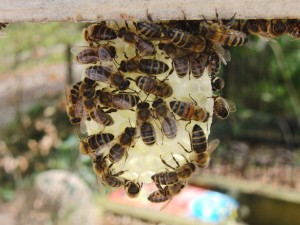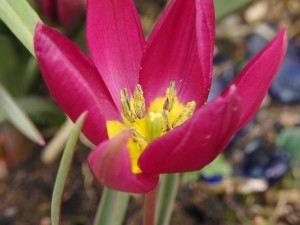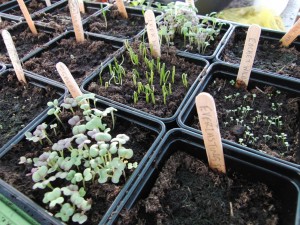 Can someone please explain to me how a headline that states that one in two of us will get Cancer in our lifetime has apparently been swept under the carpet as if it’s acceptable? Is anyone paying attention? Are we allowed to ask why, or point a finger or question the huge increases in not just cancer, but asthma, ADHD, autism, diabetes and more? Does anyone else find that appalling???
Can someone please explain to me how a headline that states that one in two of us will get Cancer in our lifetime has apparently been swept under the carpet as if it’s acceptable? Is anyone paying attention? Are we allowed to ask why, or point a finger or question the huge increases in not just cancer, but asthma, ADHD, autism, diabetes and more? Does anyone else find that appalling???
Our diet is often blamed. Too much sugar. Too much salt. Too much fat. But rarely do we hear about the pesticides used on the ingredients of pretty much everything we buy to eat. Why is that?
Do you know how many times those potatoes you roasted on Sunday have been sprayed and what with? If you know, it’s probably because you grew them yourself. And frankly that’s honestly the only way you can really, really be sure and the only way you have any control over the integrity of your food. Thank goodness more and more of us are growing our own.
Bee Friendly
Knowing what’s been sprayed on our food is our right and yet we are only told what is organic and not what has been applied to any of the crops that we might buy to feed our family. Surely that’s the wrong way round? All other food has to be labeled with its exact ingredients and additives.
But it’s not just the food we eat, but also the ‘food’ that we grow for pollinators, whether we deliberately choose ’bee friendly’<href=”https://hartley-botanic.co.uk/wp-content/uploads/2015/03/pollen-jean-vernons-blog.jpeg”> plants or not. Planting for pollinators is the latest buzz phrase (pardon the pun) and we are being cajoled, quite rightly, to plant food forage plants for these insects in trouble. But can you can be absolutely sure that those ‘bee friendly’ plants that you buy at the garden centre haven’t been drenched in neonicotinoids to kill the vine weevil or other pests that might affect them during their growth? Your new, ‘pollinator friendly’ plants, may have flowers rich in nectar and pollen but can you be sure that that nectar and pollen isn’t harboring miniscule amounts of pesticide or worse. And that’s the thing. Bees work in fractions. They harvest truly miniscule amounts of nectar and pollen from each flower. But they visit hundreds of thousands of flowers to make a teaspoon of honey, their honey, that is their food for the winter and to sustain them through their year. AND they concentrate the nectar and take out the water content to make food for their babies and their colony. So now those miniscule amounts are multiplied and multiplied to a level where they are now dangerous to the bees. Scientists have shown these toxins are present in amazingly complicated cocktails of pesticides and that they not only affect the navigation skills of the bees but also immunity and more.
plants or not. Planting for pollinators is the latest buzz phrase (pardon the pun) and we are being cajoled, quite rightly, to plant food forage plants for these insects in trouble. But can you can be absolutely sure that those ‘bee friendly’ plants that you buy at the garden centre haven’t been drenched in neonicotinoids to kill the vine weevil or other pests that might affect them during their growth? Your new, ‘pollinator friendly’ plants, may have flowers rich in nectar and pollen but can you be sure that that nectar and pollen isn’t harboring miniscule amounts of pesticide or worse. And that’s the thing. Bees work in fractions. They harvest truly miniscule amounts of nectar and pollen from each flower. But they visit hundreds of thousands of flowers to make a teaspoon of honey, their honey, that is their food for the winter and to sustain them through their year. AND they concentrate the nectar and take out the water content to make food for their babies and their colony. So now those miniscule amounts are multiplied and multiplied to a level where they are now dangerous to the bees. Scientists have shown these toxins are present in amazingly complicated cocktails of pesticides and that they not only affect the navigation skills of the bees but also immunity and more.
If you buy from specialist nurseries that grow their own plants they can tell you how your plants have been grown, but anywhere else and your questions will likely be met with confused expressions and frustration. By all means ask, the more of us that do, the better understanding others will have. In the meantime, vote with your greenhouse and our garden. Grow your new plants from seed and cuttings taken from plants that you know have not been treated with any poisons. Your plants. Share those new plants with friends, neighbours and other gardeners. Pass them on with the message that these are truly bee friendly plants and get growing for you, your family and the environment.
Grow and Share
 So here’s where I’m at. My greenhouse and garden is supplementing my diet as much as possible. I’m propagating from seed and cuttings and sharing my bee friendly plants with all and sundry, safe in the knowledge that where they grow next they provide not just vital nectar and pollen for our beneficial insects, but seed for the birds and mammals, and natural food for wildlife, all with the pesticide free promise. It’s something that every gardener and greenhouse grower can do. Take cuttings from established and old plants that have not been sprayed or treated and share them around with the message that we don’t need toxins and poisons to grow great plants and have beautiful gardens. If we want the natural balance, with the birds and the bees and everything connected we need to look at the bigger picture. Everything plays a vital role in the food chain. By removing the ‘pests’ we deprive something of its food. Do we really know what’s in those chemical sprays that are so liberally used around us? Why is it OK to blast everything and kill things with little or no regard to the consequences? We need to think about the bigger picture and question more about what we are told and more than ever strive to grow our own.
So here’s where I’m at. My greenhouse and garden is supplementing my diet as much as possible. I’m propagating from seed and cuttings and sharing my bee friendly plants with all and sundry, safe in the knowledge that where they grow next they provide not just vital nectar and pollen for our beneficial insects, but seed for the birds and mammals, and natural food for wildlife, all with the pesticide free promise. It’s something that every gardener and greenhouse grower can do. Take cuttings from established and old plants that have not been sprayed or treated and share them around with the message that we don’t need toxins and poisons to grow great plants and have beautiful gardens. If we want the natural balance, with the birds and the bees and everything connected we need to look at the bigger picture. Everything plays a vital role in the food chain. By removing the ‘pests’ we deprive something of its food. Do we really know what’s in those chemical sprays that are so liberally used around us? Why is it OK to blast everything and kill things with little or no regard to the consequences? We need to think about the bigger picture and question more about what we are told and more than ever strive to grow our own.


